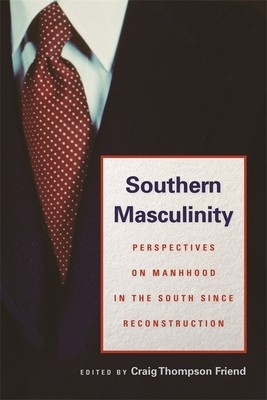
- We will send in 10–14 business days.
- Publisher: University of Georgia Press
- ISBN-10: 0820329509
- ISBN-13: 9780820329505
- Format: 15.2 x 22.9 x 2.1 cm, hardcover
- Language: English
- SAVE -10% with code: EXTRA
Southern Masculinity (e-book) (used book) | bookbook.eu
Reviews
Description
The follow-up to the critically acclaimed collection Southern Manhood: Perspectives on Masculinity in the Old South (Georgia, 2004), Southern Masculinity explores the contours of southern male identity from Reconstruction to the present. Twelve case studies document the changing definitions of southern masculine identity as understood in conjunction with identities based on race, gender, age, sexuality, and geography.
After the Civil War, southern men crafted notions of manhood in opposition to northern ideals of masculinity and as counterpoint to southern womanhood. At the same time, manliness in the South--as understood by individuals and within communities--retained and transformed antebellum conceptions of honor and mastery. This collection examines masculinity with respect to Reconstruction, the New South, racism, southern womanhood, the Sunbelt, gay rights, and the rise of the Christian Right. Familiar figures such as Arthur Ashe are investigated from fresh angles, while other essays plumb new areas such as the womanless wedding and Cherokee masculinity.EXTRA 10 % discount with code: EXTRA
The promotion ends in 17d.19:26:50
The discount code is valid when purchasing from 10 €. Discounts do not stack.
- Publisher: University of Georgia Press
- ISBN-10: 0820329509
- ISBN-13: 9780820329505
- Format: 15.2 x 22.9 x 2.1 cm, hardcover
- Language: English English
The follow-up to the critically acclaimed collection Southern Manhood: Perspectives on Masculinity in the Old South (Georgia, 2004), Southern Masculinity explores the contours of southern male identity from Reconstruction to the present. Twelve case studies document the changing definitions of southern masculine identity as understood in conjunction with identities based on race, gender, age, sexuality, and geography.
After the Civil War, southern men crafted notions of manhood in opposition to northern ideals of masculinity and as counterpoint to southern womanhood. At the same time, manliness in the South--as understood by individuals and within communities--retained and transformed antebellum conceptions of honor and mastery. This collection examines masculinity with respect to Reconstruction, the New South, racism, southern womanhood, the Sunbelt, gay rights, and the rise of the Christian Right. Familiar figures such as Arthur Ashe are investigated from fresh angles, while other essays plumb new areas such as the womanless wedding and Cherokee masculinity.

Reviews